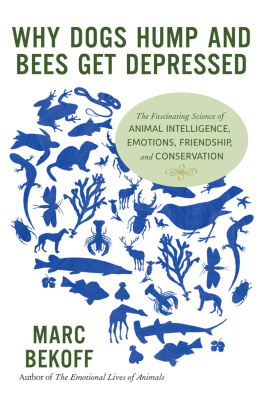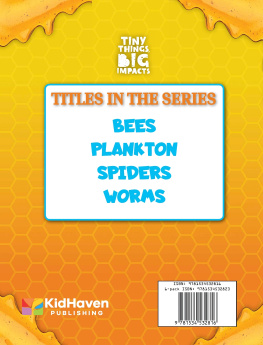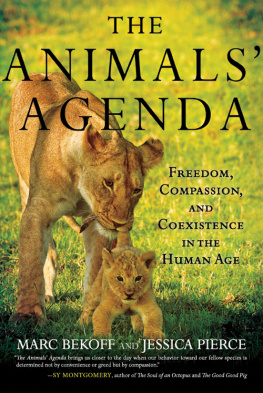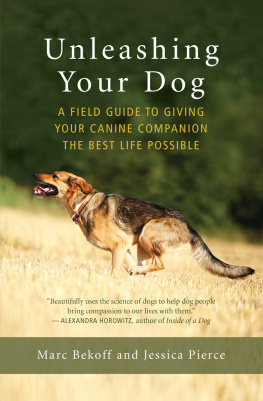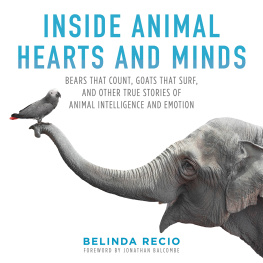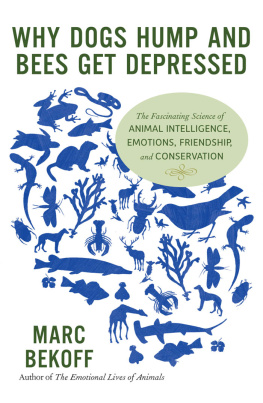More praise for Why Dogs Hump and Bees Get Depressed
Marc Bekoffs wide-ranging books are unfailingly scholarly, entertaining, insightful, and educational.
Ingrid E. Newkirk, president of PETA
Dr. Marc Bekoff has, in his characteristically brilliant, accessible, eclectic, and compassionate style, rendered unequivocally clear nothing less than an animal protection manifesto that is likely to resonate for years.
Michael Charles Tobias, PhD, president of the Dancing Star Foundation
WHY DOGS HUMP AND BEES GET DEPRESSED
Also by Marc Bekoff
Jaspers Story: Saving Moon Bears (a childrens book with Jill Robinson)
The Animal Manifesto: Six Reasons for Expanding Our Compassion Footprint
Wild Justice: The Moral Lives of Animals (with Jessica Pierce)
Animals at Play: Rules of the Game (a childrens book)
The Emotional Lives of Animals: A Leading Scientist Explores Animal
Joy, Sorrow, and Empathyand Why They Matter
Animals Matter: A Biologist Explains Why We Should Treat Animals with Compassion and Respect
Animal Passions and Beastly Virtues: Reflections on Redecorating Nature
The Ten Trusts (with Jane Goodall)
Minding Animals: Awareness, Emotions, and Heart
Natures Life Lessons: Everyday Truths from Nature (with Jim Carrier)
Edited by Marc Bekoff
Ignoring Nature No More: The Case for Compassionate Conservation
Encyclopedia of Animal Rights and Animal Welfare
Encyclopedia of Human-Animal Relationships
Encyclopedia of Animal Behavior
The Cognitive Animal:
Empirical and Theoretical Perspectives on Animal Cognition
(with Colin Allen and Gordon Burghardt)
The Smile of a Dolphin: Remarkable Accounts of Animal Emotions


Copyright 2013 by Marc Bekoff
All rights reserved. This book may not be reproduced in whole or in part, stored in a retrieval system, or transmitted in any form or by any means electronic, mechanical, or other without written permission from the publisher, except by a reviewer, who may quote brief passages in a review.
These essays appeared in a different form at Psychology Todays website.
Text design by Tona Pearce Myers
Photo on by Lenny Frieling. All other photos by Marc Bekoff.
Library of Congress Cataloging-in-Publication Data
Bekoff, Marc.
[Essays. Selections]
Why dogs hump and bees get depressed : the fascinating science of animal intelligence, emotions, friendship, and conservation / Marc Bekoff.
pages cm
Includes bibliographical references and index.
ISBN 978-1-60868-219-5 (pbk.) ISBN 978-1-60868-220-1 (ebook)
1. Animal behavior. I. Title.
QL751.B3655 2013
591.5dc23
2013024533
First printing, November 2013
ISBN 978-1-60868-219-5
Printed in the United States on 100% postconsumer-waste recycled paper

| New World Library is proud to be a Gold Certified Environmentally Responsible Publisher. Publisher certification awarded by Green Press Initiative. www.greenpressinitiative.org |
10 9 8 7 6 5 4 3 2 1
CONTENTS
I N J UNE 2009 I began writing essays for Psychology Today online under the category Animal Emotions (see www.psychologytoday.com/blog/animal-emotions). When I was first asked to do this, I emphatically said, No. I didnt need any more on my desk. However, I thought about this wonderful opportunity a lot over the next week, and then I said, Sure, why not? Im so glad I did. I jumped right in and have written around five hundred essays so far. By doing so Ive learned a lot about innumerable topics centering on our relationships with nonhuman animals and the cognitive, emotional, and moral lives of these amazing beings.
During the time Ive been writing these essays, several scientific fields devoted to animal studies have grown by leaps and bounds, such as anthrozoology, the study of human-animal interactions (also called human-animal studies); ethology, the study of animal behavior (see Lee Dugatkins book Principles of Animal Behavior); and cognitive ethology, which focuses on the study of animal minds. Studies have expanded to include numerous and diverse animals, and the scientific data show clearly just how smart and emotional other animals really are. And thats the focus of my Psychology Today essays. I try to highlight whats hot and new in the fields of scientific research and then ponder what that means for the ways in which we interact with other animals. In our culture today, there is a lot of interest in animals and how we treat them, and indeed, my essays have gotten more than one million hits and numerous comments and personal emails from a wide-ranging audience. Ive had the extreme pleasure of having contact with people of all ages from around the world. What Ive found is that people are very concerned, and ask hard questions, not only about the emotional and moral lives of other animals, but also about our complicated, challenging, frustrating, and paradoxical relationships with them.
In addition, one thing that always catches my attention is how nonhuman animals are portrayed in the popular media, especially when pictures of other animals are used to make points about human behavior. Im often frustrated because animals are rarely presented in ways that reflect what we know about them and their capacities. The media often unthinkingly repeat outdated and incorrect stereotypes, and I hope my essays, and this book, are a corrective to that. We must come to understand and appreciate animals for who they are, not for who we want them to be.
One wonderful aspect of writing these essays is the back-and-forth exchanges Ive been able to have with readers, which includes scientist colleagues and even other Psychology Today experts. These exchanges alone have made writing these essays worthwhile. As you might expect, they range all over the place, but almost invariably, I find that people feel strongly, whether in agreement or disagreement. Most people care deeply about other animals, and nearly everyone recognizes the importance of discussing how humans should care for and treat other animals. Some readers offer stories of their own, while others present additional or sometimes conflicting scientific data. In all these ways, my ongoing dialogue with readers drives home the point that our relationships with other animals and with nature are deeply complex and tell us a lot about who we are as human beings. As such, Ive included a few essays that highlight some notable exchanges Ive had. I always respect my colleagues points of view. We dont always agree, but thats not whats important. What is important is that we talk with, and not at, one another, and so come to a greater understanding of the other animals with whom we share our one and only planet.
Overall, I look at these essays as updated editions of some of my previous books, especially The Emotional Lives of Animals, Animals Matter, Wild Justice: The Moral Lives of Animals, and The Animal Manifesto: Six Reasons for Expanding Our Compassion Footprint. It was difficult to select which essays to reprint, but I tried to choose a representative sampling from the wide array of topics that I typically write about. Many present up-to-the-minute research and scientific theories about animal minds and emotions, while others are more practical and address what each of us can do to improve the lives of other animals and by doing so, improve our own. There are some fascinating surprises, such as what we are learning about the cognitive and emotional lives of bees and other invertebrates, and from time to time I get an email from a reader saying, Oh, I didnt know that. Whats nice is that the essays are jargon-free and written to be read by a wide audience, so this collection offers the latest and greatest about the fascinating lives of other animals between two covers. On occasion, essays focus on a specific event or news story, but these highlight ongoing issues or topics that remain relevant today, and will probably remain so into the future.
Next page
